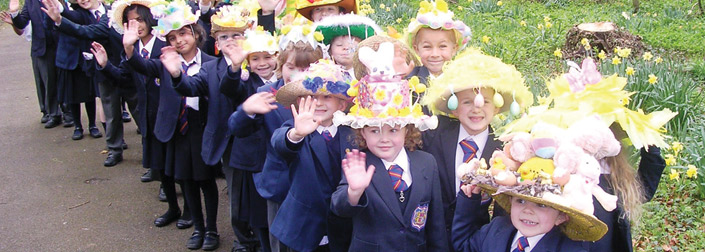Infants
The introductory years at school are absolutely vital in the development of any child.Therefore, we continue to emphasise on the provision and need for a secure, safe and stimulating environment for all our children. This is directed by caring staff, who supply guidance, support and encouragement, to help formulate each child's view of the world.
The Infant curriculum has been designed to provide a broad and balanced, knowledge-rich and skills based primary curriculum. Its content is delivered through a range of subject-specific projects, which last either a full term or half term. Overarching topic themes are History or Geography focused. Alongside these topics, accompany companion projects in Science, Art, Art and Design, Computer Science, PSHE and RE. We continue the norm that subject-specialist teachers teach PE, Music, Drama including an introduction to French so that they can continue to build on each child’s knowledge and skills learnt in their foundation years. Children in the Infant Department are encouraged to develop their natural curiosity using quality resources in and out of the classroom. We have well trained and knowledgeable staff that put the needs of each child at the core of everything they do.
Teachers in the Infant Department encourage children to develop ‘compassion’ and ‘determination.’ In addition to this, teachers provide a peaceful, kind and nurturing environment to provide equity for all. Children develop social connections and develop their talents following the school's strict code of conduct: Excellence, Compassion, Determination, Opportunity & Service. Our school’s values are thread throughout all that we do to ensure our children become equipped for the 21st century developing responsible, respectful and active citizens.
Our curriculum comes from Cornerstones Curriculum Maestro, which puts spiritual, moral, social and cultural education at the heart of its curriculum. It has been designed with three structural tiers. Each tier builds on the previous to create interconnected layers.These interconnected layers provide a robust framework that ensures connectivity across the curriculum with direct links back to the National Curriculum programmes of study.
Tier one comprises ‘Big ideas’ -global aims.
Tier two are the overarching ‘concepts’ and ‘aspects.’ A ‘concept’ is an abstract idea within a subject and an ‘aspect’ is a particular part or feature of a subject.
Tier three, is the programme of study. Concepts and aspects are broken down into smaller component parts or ‘chunks’ to form a cohesive progression framework. The progression framework runs as a ‘mixed-age group’ from Nursery to Year 6 and includes knowledge and skills that children need to know and be able to do in order to make progress.
English
In the Infant Department, English is broken into 4 dimensions: Vocabulary, Grammar and Punctuation; Composition, Word Recognition and Reading Comprehension. We have a firm belief that all children have the ability to read and write proficiently regardless of their economic background or educational needs. For that reason, we have carefully designed our English curriculum so that all children have the opportunity to thrive in literacy providing a breadth of exposure to different literary texts that link to their current topics.
Reading: in KS1 our aims are to develop the habit of reading widely and often for both pleasure and information. Likewise, we wish to continue to embed the practice of reading for life-long learning. From the early years through to the end of Year 2, we use Twinkl Phonics to teach the decoding of words. In KS1, our children cover levels 5-6. They continue to learn only two sounds per week with a consolidation day to revisit learnt phonemes, segmenting and blending fluency and common exception words. Reading comprehension is delivered through dialogic discussion where children begin to summarise, recall and retrieve information.
VCPS: children continue to refine their decoding skills and fluency. They develop a skills based toolkit of age appropriate grammatical structures and begin to use punctuation whilst mastering sentence structure and word classification.
English Composition: children learn the process of writing through a skills based approach. They are taught through explicit modelling of ‘writers' thought’. Children demonstrate their understanding of the English language, genre of writing and evolving literary flair by planning, drafting, revising and editing their work before publishing it.
Maths
Mathematics is an integral part of the curriculum in the Infant Department. There is a great emphasis on teachers identifying misconceptions and regularly responding to children so that we can quickly close gaps in the chronology of their mathematical knowledge (from their early years experience). With this, we have chosen to use the scheme White Rose Maths so that the knowledge and skills have been systematically mapped across school from Nursery through to Year 6. Children are given regular opportunities to apply mathematical facts, concepts, methods and strategies that they have learnt. We do this by using a Maths Mastery approach that places emphasis on conceptual understanding before procedural knowledge. Our aim is for children to become proficient mathematicians so that they can deepen their confidence in the subject through reasoning and problem solving building on the school value of determination and opportunity.
There are two progression cycles to the WIS Primary Curriculum. The overarching projects are:
-
Cycle A: Childhood History -History, Bright Lights, Big City -Geography and School Days -History, PSHCE follows: Team work, Think Positive, Diverse Britain, Be Yourself, Its My Body, Aiming High
-
Cycle B: Movers and Shakers-History, Magnificent Monarchs-History and Coastline Geography. PSHCE follows: Relationships, Safety First, One World, Digital Wellbeing, Money Matters, Growing up

